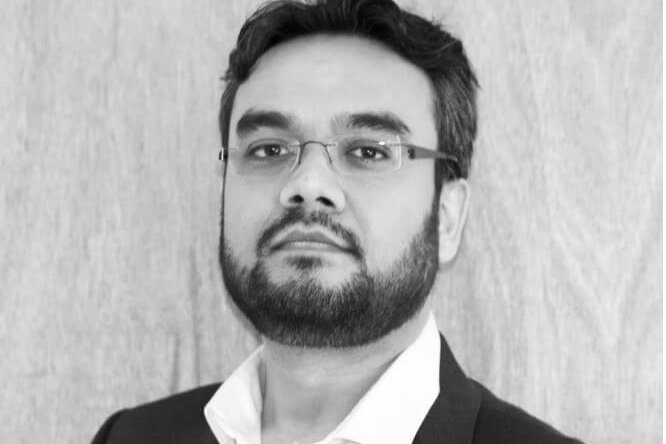

Dr Naseem Naqvi
Among the biggest challenges in blockchain, is the “fake news, noise and hype,” according to the co-founder and president of the British Blockchain Association.
In an interview with Coin Rivet, Dr Naseem Naqvi goes on to say: “The challenge is how can you separate the fact from the fiction and the truth from the noise?”
He adds: “The single most effective strategy in the hype created surrounding the technology is the search for the truth and in doing that you have to establish the facts.”
But how? This is where the principles of academia come in to play.
He says there are those who have “a vested interest in blockchain” – such as the investors and developers who have stakes in the ecosystem. Their opinions are “not going to be unbiased,” he points out.
Then there is the “very large community that do not understand the technology very well, but are just following the crowd.”
The truth, he believes, lies somewhere in the middle of the “sceptical observer who has been sitting on the fence and the maximalists who firmly hold their own version of the truth.”
It is up to educationalists, researchers and ambassadors to “find the truth,” he adds.
The British Blockchain Association exists to promote the comprehensive adoption of blockchain technology and it is an advocate for education on blockchain adoption within profession.
It aims to build a close-knit network of experts and organisations connecting policymakers, blockchain engineers, venture capitalists and visionaries.
It calls for national adoption of Distributed Ledger Technologies to bring tangible, real world impact with economic sustainability and a vision to make Britain “one of the leading nations in blockchain arena by benchmarking exemplary standards.”
Dr Naqvi says in order to learn about the space, it’s important to attend workshops and seminars, to read books and watch videos to “try and figure out” the truth.
When it comes to asking experts, he says: “The problem is, who are the experts?”
“In research, Malcolm Gladwell says it takes 10,000 hours of practice to become an expert. Assuming you put three hours a day for a month that would be 1,000 hours a year. The technology has been around for the 10 years it would take to become an expert.
“There are not very many experts in blockchain and there are so many different types of blockchain.”
In order to become more knowledgeable, he says it’s important to look at evidence-based research in order to make decisions and it’s important to “decide on the best available evidence.”
He says if the CEO or person in charge of a company or institution is looking to implement blockchain technology, it’s important to consider three questions – “Is there a clearly defined problem that currently exists, Can blockchain solve this problem or is the existing solution better and if so, where is the evidence from research?”
Decisions should be made “based on evidence, not emotions or opinions or gut instinct. Very few people understand blockchain well and there is a lot of noise.”
Dr Naqvi was first introduced to blockchain four years ago when a friend sent him information about cryptocurrency and told him to buy as the price was going up.
“My first reaction, as a medical doctor and educationalist, was to learn more before making a decision,” he says. He asked which country owns cryptocurrency but quickly realised it was “completely decentralised.”
People are so reliant on third parties to control money and digital assets, which partly explains the fluctuations in price, as well as the lack of understanding.
It is “very important to understand the technology and why it started and its long-term aims and objectives with people power,” he adds.
The association publishes the Journal of the British Blockchain Association, next published in April, is a peer-reviewed journal with all articles evaluated by experts before publication, ensuring credibility, reliability, accuracy and authenticity.
It follows a ‘double-blind’ process where reviewers don’t know who the article author is and vice-versa so articles succeed or fail on their own merit and not the reputation of the author.
“Blockchain and digital currencies are a scientific discipline,” Dr Naqvi adds. The JBBA is a “benchmark and bedrock of objective scientific evidence which is reviewed by an independent scholar for accuracy and reliability.
“The information has the authority of approval that is robust and relatively free of bias. There is a high degree of scrutiny,” he adds.
He says if someone is calling themselves an expert “probably they are not experts. My first question would be which blockchain technology, do you have practical experience, have you published any papers, are you a coder or developer and have you implemented any projects?”
“There’s a misconception that in order to be involved in blockchain that you have to be a computer scientist.
“There are two types of activity – internal with research, programmers, coding and software and external with blockchain in the real world in the logistics and supply chain and in economics, policy and science.”
He says blockchain is “not a test of accuracy, it is a test of time stamping and validity that is tamper proof. It is immutable, but it depends what is written in the code” and doesn’t apply to all.
“It’s vey important to look at the ecosystem as well. Some maximalists and some believers think it is very difficult to have this 100% truth in this ecosystem.”
Denver, Colorado, 24th February 2025, Chainwire
Denver, Colorado, 20th February 2025, Chainwire
Washington, D.C., 18th February 2025, Chainwire
Dubai, UAE, 27th January 2025, Chainwire
Those who enter the market at this time may be surprised to hear that Bitcoin…
George Town, Grand Cayman, 22nd November 2024, Chainwire